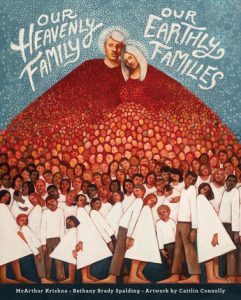BestBooks is a record of all of the books that I have read since November 2004, with brief descriptions and reviews.
Friday, September 30, 2016
Monday, September 26, 2016
Tuesday, September 20, 2016
Friday, September 16, 2016
Friday, September 09, 2016
Tuesday, September 06, 2016
Our Heavenly Family by McArthur Krishna and Bethany Brady Spalding
 Our Heavenly Family, Our Earthly Families by McArthur Krishna and Bethany Brady Spalding with artwork by Caitlin Connolly (link)
Our Heavenly Family, Our Earthly Families by McArthur Krishna and Bethany Brady Spalding with artwork by Caitlin Connolly (link)
It's easy to underestimate a kid's book. After all, they look as if you could write one in less time than it takes for a Netflix binge and you can read one to your kid in twenty minutes or so. But the impact that a little book can have on a little mind is enormous.
And that is why I find this book fascinating. It presents an LDS theology of the family to preschool and younger elementary-aged children. And, perhaps amazingly, it is one I suspect progressive Mormons will warmly embrace. All references are to "Heavenly Parents," quotations are drawn from female and male leaders, and a variety of family formations are acknowledged. The focus throughout is on the crucial importance and central role of families, and how to make our earthly families more like our heavenly family.
Now, I don't know if children will love this book. Pages are titled, for example, "Families Thrive with Love" and "Families Counsel Together." There are two-paragraph explanations of each title followed by several questions for discussion ("What's your job in a family council?") and a quotation from an LDS authority. There's no story. It's pretty didactic. It reads a bit like a church lesson manual.
So this might be a book that pleases the adults more than the kids. But I still think it has great value. If you spend any time on the Internet, you realize that LDS sentiment (at least, the vocal portions of it) is divided into two camps: one thinks the family is under attack and so we need to talk and preach and teach about the family, and one thinks that appeals to "the family" are mostly efforts to stigmatize certain kinds of families. I'm not seeing a lot of middle ground out there. But I do in this book: it is extremely family-focused in a way which I think more conservative saints will appreciate but also extremely inclusive, in a way which I think more liberal saints will appreciate. The way that they pulled off the pro-family and pro-inclusion message in one short children's book could hopefully be a template for how we might talk about families--and for healing the chasm between the two sides.
Review copy provided by publisher.
Subscribe to:
Comments (Atom)





